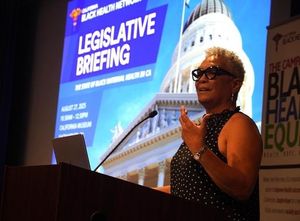The Democratic Republic of Congo (DRC) is on the verge of receiving significant support to combat the troubling rise of mpox, previously known as monkeypox, thanks to the proactive measures taken by Japan. With the Africa Centres for Disease Control and Prevention (Africa CDC) announcing the imminent arrival of three million doses of mpox vaccine from Japan, there's cautious optimism about curbing the outbreak, particularly affecting children.
Currently, the DRC is the epicenter of the mpox outbreak, which the World Health Organization (WHO) has classified as a global public health emergency. Data from the Africa CDC reveals alarming statistics, indicating more than 44% of the 10,533 confirmed mpox cases are children under 15 years old. This alarming trend has prompted health authorities to act swiftly; the new vaccine is expected to be administered to children between the ages of zero to five.
Jean Kaseya, the director-general of the Africa CDC, characterized the vaccine donation from Japan as pivotal, stating, “The good news we got from Japan is next week we are getting the Japanese vaccine in DRC.” The vaccine, known as LC16m8, was initially developed for smallpox and has proven effective against mpox. It is particularly noteworthy as the previous vaccines available were only approved for individuals aged 12 and up.
On the ground, vaccination efforts have already started, but the absence of vaccines suitable for younger children highlighted a significant gap. Kaseya emphasized this by noting the urgent need for pediatric vaccinations, underscoring the vulnerability of young children to this potentially deadly infection. With Japan’s substantial donation, health officials believe they can fill this gap and provide much-needed protection to the country’s youth.
To efficiently roll out the vaccine, Japan is sending health care personnel to the DRC to train local health workers on the use of bifurcated needles, which require pricking the skin multiple times—15 times, to be precise—to deliver the vaccine. Dieudonne Mwamba, head of the DRC's National Institute for Public Health, expressed confidence about the training, stating, "This weekend, we will familiarize them with this method of administration." He noted the importance of adopting this new approach to maximize the vaccine’s impact.
Beyond the immediate concerns of mpox, the DRC has faced various health challenges, including recent reports of unexplained illnesses leading to numerous fatalities among children. Some officials attribute rising health crises to poor access to medical care and the pervasive conditions of malnutrition prevalent among many youths. Such parallel issues complicate the public health narrative within the nation.
Over the past week alone, the outbreak of mpox has manifested starkly, with Africa CDC reporting over 3,500 new cases across Africa, the majority of which originated from the DRC. Kaseya stated, “This surge indicates we face major public health challenges.” Adding to these woes, there’s been significant ambiguity surrounding other health crises, including mystery illnesses affecting children, with symptoms resembling viral infections such as fever and respiratory distress.
Continued regional support and enhanced healthcare infrastructure are deemed necessary by health experts to combat these multiple threats effectively. African nations, including the DRC, are continuously battling against health adversities, often compounded by socioeconomic challenges. The recent vaccine donation stands as part of larger international collaborative efforts aimed at addressing these urgent public health needs.
Looking forward, Kaseya hinted at future negotiations with Japan to explore additional vaccine doses, hinting at the Africa CDC's desire to secure more resources as the need arises across the continent. "We are negotiating with them to explore options for additional doses for other countries on the continent," Kaseya informed. The response from Japan was positive, indicating potential for broader access to the LC16m8 vaccine.
Health authorities remain committed to addressing the mpox outbreak comprehensively, with preventive measures integrated alongside response strategies. The urgent deployment of the newly acquired vaccines for children, combined with thorough training of healthcare workers, is anticipated to make strides toward enhancing immunization rates among one of the most vulnerable populations.
Despite the challenges posed by the outbreak, the recent collaboration between Congo and Japan highlights how international partnerships can potentially lead to swift responses. The successful allocation and distribution of the vaccine can also serve as a blueprint for future health interventions within the region, ensuring the well-being of children and communities at large are prioritized.
For now, the eyes of the world will be on the DRC as they kick off this significant vaccination effort. Amidst the fears posed by rising case numbers, there remains hope; hope powered by the support of international allies, local leadership, and the resolve of health workers committed to safeguarding the health of their communities—the cornerstone of any effective public health response.



